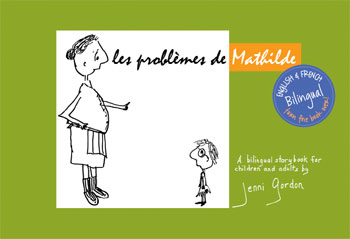Teaching French By the Book
There’s nothing worse than facing a room of 25 college kids – and boring them, says University of Michigan French instructor Jenni Gordon.
In Paris years ago, the Ann Arbor resident discovered the power of storytelling in the classroom. Recently, in an attempt to help her UM students grasp the difficult concept of imparfait (imperfect past tense), Gordon wrote and illustrated a bilingual children’s story to share with them.
It worked.
The story of a little girl named Mathilde stirred within the students so many memories of childhood. “Suddenly, lots of people had a story to tell in the past tense!” said Gordon.
Now Press Lorentz/littleBeast Books in Ann Arbor has published Gordon’s story of Mathilde, a little girl with mixed feelings about her new baby brother. It’s titled both “Les Problemes de Mathilde” and – on the flip side – “One day, I had enough!”
The story is already a hit with the 20-ish crowd.
“I realized I had something going for me when they’d say, ‘No, no, don’t stop there. Keep going!’” recalled Gordon, sitting in her apartment on the city’s north side. “And this was a group of undergraduate students.”
The story is a familiar one. As the oldest of four children, Gordon recalls what a drag it was to “welcome” a baby sister into the family decades ago. “I thought she was coming with her parents – and leaving with them,” she recalled with a laugh.
Gordon, a first-time author at 57, said the collaborative endeavor has been both creative, and lots of fun.
Publisher Jude Wilson got involved with the project when she fell in love with the character of Mathilde, and knew others would, too.
“The combination of Jenni’s brilliant illustrations and narrative style immediately convinced me that readers of just about any age would instantly want to be friends with Mathilde, could read her story a hundred times and still enjoy it, and would identify with both her problem and the ultimate solution,” she said.
Wilson also thinks Ann Arbor parents will like the idea of a bilingual book as a way to introduce their children to the French language.
Born in Detroit and raised in the metropolitan area, Gordon earned a bachelor’s degree in education at UM. After working for three years in Nashville and Boston, she decided it was time for adventure. A big one.
“I had studied French in high school so I could speak it, but as soon as someone answered me, that was the end of the conversation,” she said. “But I was fascinated with the chance to step into another universe.”
So she packed up and moved to Paris, staying the first couple weeks with cousins she’d never met. Soon she was teaching English as a foreign language in a French private school.
“They had me teaching six- and seven-year-olds a language they didn’t understand at 3 in the afternoon,” she said. “The French school day is fairly intense. So by that time, they were all kind of basket cases.”
One day she drew a small dog – the only thing she could draw at the time – and began a tale about a pup named Hoover.
That’s all it took.
“Suddenly I realized the power of drawing, and the power of a story,” she said.
“Anytime I wanted to get their attention and teach them something, I’d use the character of Hoover.”
Soon she was drawing other little characters, again keeping the kids’ interest in their stories. Through the years, she realized people of all ages love a good story.
“Stories, particularly stories that engage the emotions, and sometimes old buried universal emotions, tend to awaken if not passion, a very focused interest and sense of fun,” she said.
After a few years, she switched to tour guiding, escorting groups of American teachers and students on educational tours throughout western Europe.
The job wasn’t as romantic as it sounds.
“You’re up every day at 6 with your suitcase, responsible for 40 teenagers who are losing their passports, busting into the mini bar, and passing out in the hallway,” she said with a smile.
When she returned to the United States in 1995, Gordon spent four years teaching English as a Foreign Language to adults of varied nationalities in Detroit before beginning work as a lecturer at UM in 1999. As a full-time instructor, she teaches all levels of elementary French.
“French is an abstract language, and there’s a way of communicating, whether it’s with someone on a train or with someone with whom you’re having dinner, that goes very easily to an abstract level. The conversation itself takes on a life of its own,” she said. “American conversation tends to be more personal, more sharing, more open in a lot of different ways. So if you’re deprived of either of them – in my case, because I was brought up American and lived in France – then I miss them.”
Gordon, who is single, lives in an apartment in the upper level of a house on the city’s north side. She loves it not because it reminds her of bustling Paris – but because it doesn’t. Rather, it’s quiet and woodsy and feels very Midwest American.
Still, she misses Parisian culture.
“I would miss it much more if I weren’t working in the French department, because it’s a very international environment, and I’m speaking the language all the time,” she said. “But I do miss it. It’s a hard place not to miss … Paris has a personality all its own, and you can develop a love-hate relationship with it, just like a lover.”
Gordon’s book is available by ordering online at Press Lorentz/littleBeast Books or calling 734-604-1627.
About the author: Jo Mathis is an Ann Arbor-based writer.







Nice piece. Good to see a favorite byline again.
Chère Jenni,
Quelle aventure…je me rappelle encore de nos discussions au MLB sujet des premières planches sur lesquelles Mathilde n’en faisait que des siennes.
J’ai hâte de découvrir la suite de l’histoire.
Bravo,
R.